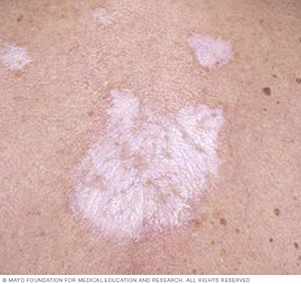-
Featured News
Mayo Clinic Q and A: Lichen Sclerosus Needs Ongoing Care

DEAR MAYO CLINIC: A little more than two years ago, I was diagnosed with vulvar lichen sclerosus. My doctor prescribed a topical cream, which I still use once or twice each week. I have never been back for a recheck, but I recently read that I should be getting a regular exam, because this condition might cause vulvar cancer. How often do you recommend that I see my doctor?
ANSWER: Thank you for your question. Given it is a chronic condition, most women who have vulvar lichen sclerosus need long-term treatment. At this time, the evidence is not clear whether lichen sclerosus actually raises the risk for vulvar cancer, though there may be a small chance that cancer could develop. Therefore, you should have follow-up evaluations regularly, as recommended by your doctor. As long as your symptoms are well-controlled with the cream you are using, a checkup with your primary health care provider every six to 12 months likely will be enough to monitor your condition properly.
Lichen sclerosus can appear anywhere on the body. It is most common on the skin of the vulva, foreskin of the penis and skin around the anus. Vulvar lichen sclerosus causes light-colored, itchy patches of skin on the vulva. At first, these patches of skin may look shiny and smooth. The patches then may become wrinkled and thin. The thin skin can tear, bruise or bleed easily, causing significant discomfort. In time, the skin also may become scarred. The scarring can lead to pain during sex, as well as pain or difficulty when you urinate or have a bowel movement.

Anyone at any age can get lichen sclerosus, but postmenopausal women are affected most often. The cause of this condition is not well-understood. It may be connected to hormone changes in the body. It also might be an autoimmune disorder, where the body’s immune system attacks its own healthy organs or tissue. It’s important to remember that lichen sclerosus is not caused by a virus, and it’s not a sexually transmitted disease. It isn’t contagious and can’t be passed from one person to another.
The most common treatment for lichen sclerosus is a prescription of corticosteroid cream. It often stops the itching and discomfort, and prevents scarring. When first using the corticosteroid cream, it typically needs to be applied to the affected areas of skin every day for several weeks. Once symptoms are under control, many women need to continue using corticosteroid cream two or three times a week long-term to keep their symptoms from coming back. In most cases, no other treatment is required.
At this time, the connection between vulvar lichen sclerosus and vulvar cancer is not clearly understood. Some research studies seem to show there may be a small chance that skin affected by lichen sclerosus could be at higher risk for developing cancer. Results from other studies, however, have not found the same correlation.
It is important to see your health care provider on a regular basis so he or she can confirm that the treatment for lichen sclerosus is working. Your health care provider also can check for side effects from the treatment and watch for any new skin changes that may require further evaluation. Follow-up exams generally are recommended every six to 12 months. Contact your doctor to decide on a follow-up schedule that’s appropriate for your situation. — Dr. Beatriz Stamps, Gynecology, Mayo Clinic, Scottsdale, Arizona







